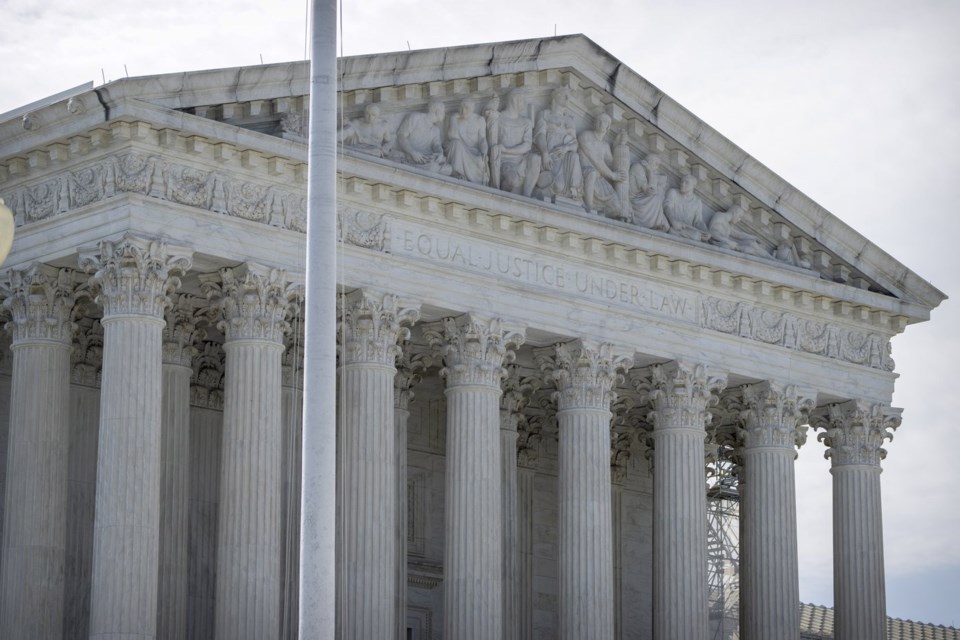WASHINGTON (AP) ŌĆö Virginia on Monday asked the U.S. Supreme Court to intervene to allow the state to remove roughly 1,600 voters from its rolls that it believes are noncitizens.
The request comes after a federal appeals court on Sunday unanimously upheld a restoring the registrations of those 1,600 voters, whom the judge said were illegally purged under an executive order by the state's Republican governor.
Gov. Glenn Youngkin says he ordered the daily removals in an effort to keep noncitizens from voting. But U.S. District Judge Patricia Giles ruled late last week that Youngkin's program was illegal under federal law because it systematically purged voters during a 90-day ŌĆ£quiet periodŌĆØ ahead of the November election.
The Justice Department and a coalition of private groups removal program earlier this month. They argued that the quiet period is in place to ensure that legitimate voters aren't removed from the rolls by bureaucratic errors or last-minute mistakes that can't be rectified in a timely manner.
Youngkin said he was simply upholding a state law that requires Virginia to cancel noncitizens' registration.
The ruling Sunday from the three-judge panel of the 4th U.S. Circuit Court of Appeals in Richmond, Virginia, sided with the judge who ordered the restoration of voters' registrations.
The appeals court said Virginia is wrong to assert that it is being forced to restore 1,600 noncitizens to the voter rolls. The judges found that Virginia's process for removing voters established no proof that those purged were actually noncitizens.
Youngkin's executive order, issued in August, required daily checks of data from the Department of Motor Vehicles against voter rolls to identify noncitizens.
State officials said any voter identified as a noncitizen was notified and given two weeks to dispute their disqualification before being removed. If they returned a form attesting to their citizenship, their registration would not be canceled.
The plaintiffs said that, as a result of the program, a legitimate voter and citizen could have his or her registration canceled simply by checking the wrong box on a DMV form. The plaintiffs presented evidence showing that at least some of those removed were in fact citizens.
A similar lawsuit was filed in Alabama, and a federal judge there to restore eligibility for more than 3,200 voters who had been deemed ineligible noncitizens. Testimony from state officials in that case showed that roughly 2,000 of the 3,251 voters who were made inactive were actually legally registered citizens.
The appeal filed to the U.S. Supreme Court on Monday by VirginiaŌĆÖs Republican attorney general, Jason Miyares, asks the high court to intervene by Tuesday. Without any intervention, the injunction issued last week by Giles requires Virginia to notify affect voters and local registrars by Wednesday of the restorations she ordered.
MiyaresŌĆÖ filing argues that requiring Virginia to restore the voter registrations of those who have been identified as noncitizens is a ŌĆ£violation of Virginia law and common sense.ŌĆØ
Virginia also argues that requiring these changes less than a week before the presidential election is bound to create confusion, ŌĆ£creating a massive influx of work for its registrars in the critical week before the election, and likely confusing noncitizens into believing that they are eligible to vote.ŌĆØ
The 4th Circuit opinion was written by Toby Heytens, a Biden appointee, and joined by Chief Judge Albert Diaz and Judge Stephanie Thacker, both Obama appointees.
The panel emphasized, as Giles did in her initial ruling, that the state is within its rights to remove noncitizens from the voter rolls, even during the 90-day quiet period, but must do so in an individualized process rather than the systematic process relying on data transfers from the DMV.
Nearly 6 million Virginians are registered to vote.
___
Barakat reported from Falls Church, Virginia.
Matthew Barakat And Mark Sherman, The Associated Press


